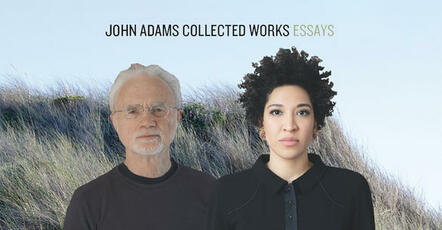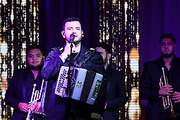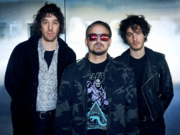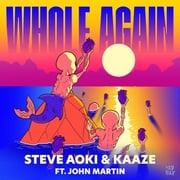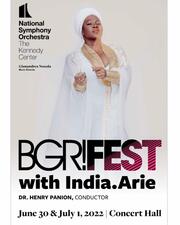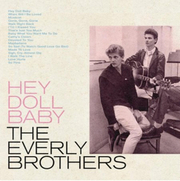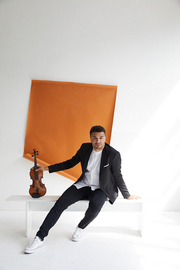New York, NY (Top40 Charts) Nonesuch Records released the forty-disc John Adams Collected Works, a box set of recordings spanning more than four decades of the composer's career with the label, last Friday. It includes two extensive booklets with new essays and notes by Timo Andres, Nico Muhly, Jake Wilder-Smith, Robert Hurwitz, and Julia Bullock. Below is Bullock's note:
Back in 2011, my former classmates from Eastman School of
Music and I decided to make a pilgrimage of sorts to the Metropolitan Opera in New York, to hear Nixon in China. It was to be an historic event: the first time this opera was to be heard in the theater; the first time John Adams would be conducting from the Met podium; the first production on that stage to be directed by
Peter Sellars. But in truth, those historic firsts weren't what excited me about attending, because I had no investment or interest in the buzz of the music business at that time. I was still a music student at Bard College, living in the Hudson Valley, and I just loved the idea of going to hear the music of a living American composer at the Met with my music school friends. I wasn't very familiar with the opera (or any of John's music for that matter), other than the famed arias "News has a kind of mystery" and "This Is Prophetic!"
It's been ten years, but I vividly remember the stark images from that night. Red, blue, gray, and forest green echoed across the broad stage. Individual performers seemed to be at such a remote distance, both from each other and from the audience; each character isolated, independent, lonely. The musical moments I most remember are of pulse, precision, and power. The strict performative unity of the choir, orchestra, and ensemble singing in close harmony was chilling—even threatening. It was an electrifying night. And yet, as impressed as I was by the performance, in a theater packed for an historic musical event about an historic time, I admit I didn't leave the Met feeling compelled to delve more deeply into John Adams's music. The impact of the opera, as stirring as it was, remained contained to that live theater experience.
It's interesting to reflect on that now, as I write this during the COVID-19 pandemic, because there is an ongoing discussion about the importance of hearing music in live performance. As a performer, of course I value the live experience and want to share it with as many people as possible. But I can't deny that in many cases, I've first come to acquaint myself and fall in love with certain musicians and their music through exposure to their recordings. Listening on repeat allows me to develop an intimate connection with the material. The process of coming to deeply appreciate and feel connected with John Adams and his music has been no different.
In 2014, while studying at The Juilliard School, I got a message from my manager that the New York Philharmonic was setting up an audition to have me sing for John in person, because he was looking for a soprano for his Christmas oratorio El Niño. Although excited about the opportunity, I didn't know the work, so before agreeing to take the audition, I wanted to determine whether I even felt compelled to sing it. I checked out a copy of the score and the audio recording from the Juilliard library. It made me happy to see some familiar names:
Peter Sellars, who created the libretto and whom I had already worked with at that point; soprano Dawn Upshaw, whom I came to know very well while earning my master's degree from Bard's Graduate Vocal Arts program; and mezzo soprano
Lorraine Hunt Lieberson, whom I only "knew" because I idolized her performances of Handel and Mozart on DVD. I settled into a small cubicle in the library with a set of headphones, and listened with the score, liner notes, text, and translations in hand.
With a rush of instruments and a hushed choir murmuring syllables that slowly evolved into the word "maiden," I felt immediately ignited and invested while listening to this recording in solitude.
Tears streamed down my face, my thoughts raced. I was transported. It may seem strange when I compare that profound, private experience listening to a recording in a library, with how I was impressed by—and yet a bit detached from—the power of John's music while hearing it live, surrounded by thousands of people in a stadium-like setting at the Met. Maybe that says more about me than the context or the content, but all I know is that for two hours while listening to El Niño in that cubicle, I felt invited into a space I hadn't ever experienced so poignantly. This work was centered around the fragility of human existence, not human accomplishment. It centered on women, children, and life. Was it the compact and transparent voices of the three countertenors, combined with the unwavering directness of Dawn Upshaw's delivery, that affected me so deeply? Or the fire and fragility of
Lorraine Hunt Lieberson's voice? For whatever reason, at the end of it I not only wanted to sing John's music, I felt like I understood what he was aiming to accomplish with it, and also maybe what I could aim to do with it.
For my audition, we were in one of the red-carpeted rehearsal spaces at the New York Philharmonic, surrounded by mirrors. John sat on a couch across the room. I began with Olivier Messiaen's "Résurrection" from Chants de terre et de ciel. "Alléluia" is the first word, soaring and roaring as a prolonged melisma. The final lyrics are, "Parfum, porte, perle, lavez-vous dans la Vérité" [Perfume, portal, pearl, wash yourself in the Truth]. When I finished, John sat back and said, "You know, Messiaen's music requires the performer to be swept away in a transcendent space, or it just doesn't work. You just go there, Julia. I'm not sure my music will ever go where Messiaen's did, not ever..." Attempting to brush his comment aside, I shook my head and my hand, and said, "I don't know what you're talking about, John."
And I genuinely didn't. Over the course of my life, there have been only a few musicians whose material had me transfixed to such an intense degree after having listened to it for only a few minutes. Messiaen's music certainly did that for me, which is why I chose to sing it that day, and after listening to El Niño, I could say the same about John Adams. But I had just met this man, and didn't yet want to reveal how swept away I had been the week before.
I went on to sing several other songs ranging in style, including "Brown Baby" by Oscar Brown Jr. and "La conga Blicoti," an upbeat dance tune that Josephine Baker originated. John was either quiet, smiling, or chuckling. We then sat on the couch and talked for a while. He told me that his era was really the 1970s, and that even though he always wanted to write an opera about the
Black Panthers, he didn't feel it was his story to tell. My admiration for him grew as we sat and chatted. He had earned a name for himself by memorializing particularly poignant moments in history, but he was cognizant of when and where to position himself. He didn't presume to represent everyone or everything. Before we met in person, I felt like I understood his music—but now, over the course of those 30 minutes together, I felt that we were beginning to recognize each other with calm, mutual respect.
The following week, I was asked to consider singing several live concerts and staged performances of John's music, as well as the new Nonesuch recording of Doctor Atomic with the BBC Symphony Orchestra and BBC Singers. I was also told that he was writing a new opera, and had my voice in mind. I was excited and a bit scared, but weirdly not surprised, based on the time I'd spent with John that afternoon. After looking through the repertoire offered, I couldn't wait to rip into the scores, to study and sing John's music. He wrote good tunes with pulse and drive, and he was so mindful of the intense words that he chose to set.
The first piece of John's that I performed was El Niño, with the LA Phil in December 2016. I remember the experience distinctly, as I often find myself in a hyper-alert state while performing John's music. But hearing the children's choir at the end of the oratorio—the clear, untarnished sound of young voices emerging from the sonic haze of the orchestra—was an unforgettable musical moment. It communicated how unwavering stability and resilience can be found in something gentle, even vulnerable. John and
Peter were in the audience, and I was honored to lend my voice to a work that I consider to be one of their greatest collaborations.
The next project, scheduled just a few months later, was Doctor Atomic—my first commercial studio recording. I was terrified, in part because I was quite sick with a case of laryngitis going into the recording sessions. For several days preceding I was on complete voice rest. I didn't dare tell John how delicate I felt, and how careful I thought I needed to be. In retrospect, maybe that delicate nature was perfect for the recording. It led to a certain fragility paired with determined fire that
Lorraine Hunt Lieberson always seemed to capture. I tried to center on precision and clarity of the rhythm and words, like Dawn Upshaw always seems to have as her primary focus. But above all, what became paramount was the intention behind my delivery. Since I hadn't performed the work before, I needed to make explicit decisions on the characterization.
I stood to John's right side as he conducted. Naturally I wanted him to be pleased, but mostly I wanted to please myself—I wanted to offer a performance that was definitive, not derivative, and I wanted to capture the consciousness of Kitty Oppenheimer, a troubled woman living in a troubled time. Most of Doctor Atomic takes place in the hours leading up to the testing of the atomic bomb on July 16, 1945. There was great anticipation for this scientific development, a "creation" that promised the preservation of some, and the destruction of others. In John's musical and theatrical interpretation, Kitty Oppenheimer seemed to represent the voice of many, yet didn't have the ear of anyone. She was combustible, and inexhaustible in how far her expression of thoughts and feelings could extend.
Listening to the recording now, there are some technical mistakes—a few wrong words of Muriel Rukeyser's poetry, some inaccurate rhythms—but it's clean and clear as an entire musical offering. And it established this important musical relationship and friendship in my life.
In June 2016, a few months prior to the performance of El Niño, I took another pilgrimage to hear John's music. This time it was to John's house, with
Peter Sellars by my side.
Peter and John were so excited about their new opera, Girls of the Golden West.
Peter had told me, "John didn't know how to write the effervescence of this woman,
Louise Clappe (a.k.a. Dame Shirley), until after he'd heard and met you for the first time." I was filled with curiosity.
We gathered around John's computer with the digital score and listened to a MIDI realization—a shallow, computerized audio file that gives just enough information to grasp what the music aims to achieve. I first enjoyed what I heard. It was as if Kurt Weill and John Adams had a meeting in sonic space. But as he went on playing through sections of the opera and the arias he'd written for the other singers, I started to feel jealousy and frustration. I was strangely envious of how John captured the brilliance of Frederick Douglass's words and the despair yet unwavering strength of Josefa's character. Even though John had told me that two of my main arias—Dame Shirley's delivery of a Lady Macbeth soliloquy, and the ode to California at the end of the opera—were not yet written, all I could say of Dame Shirley's music that day was that it was "delightful," which I know wounded John and
Peter to a degree.
Those feelings quickly faded once I started working on the role. While learning the Lady Macbeth aria, I wrote to John telling him that I was in hysterics laughing and screaming, because the extremes of the vocal writing were so intense. The music was wild, irreverent, searing. In this soliloquy, Lady Macbeth, an otherwise noble woman, beckons nature to make her less of a human being so she can commit crimes against humanity. This attempt to harness violence stood in complete contrast to the last aria of Dame Shirley, which closes the opera. The music was lyrical and flowing. It was about reflecting on life and gaining perspective, even after something that was once whole had been shattered.
I was so proud of Girls of the Golden West, which premiered at the San Francisco Opera in 2017. I was proud of my colleagues and what we created together on stage. We were a family that struggled with, occasionally got disappointed in, but most often found ourselves in awe of each other. As a result, I didn't expect the piece's reception, especially the reviews, to be so dismissive. Also, as sensitive as I was as a performer about reviews, I didn't expect that this composer—who had already gone through the experience of not having his work embraced at its premiere, only to have it recognized a decade later—could be hit hard by any critique. I had to ask myself what my contribution was to the perceived failure. Because if my persona had inspired the writing for Dame Shirley in this production, then what was my role in this?
I've since listened back and watched some of the opera myself. For obvious reasons, I can't be fully objective. But what some critics identified as shallowness in the first half of the opera, especially in comparison to the second half, is exactly what I feel John and
Peter aimed to frame. They captured and critiqued a certain perception of American history—the one that is typically written and told by white men—which has the habit of not taking full responsibility for its choices, of making a lot of assumptions, and is often presumptuous and proud. It takes the entire first half of the opera for the stereotypes of the Wild West to unfold and collapse. It's only after this point that the characters reveal the full extent of who they are and what they represent. It is a pointed slap in the face to those accounts of American history which are superficial, incomplete, and highly abridged.
While working on Girls, I told John that I wished there was a moment when all of the women would unite and sing together. He replied that, other than his choruses, he doesn't write voice ensembles anymore because he can't tolerate when it's impossible to understand everyone's words upon first listening. I thought back to the final scene of Nixon in China and also some parts of Mozart's sextets, when you can't grasp every word, but nevertheless there's power in listening to the overlay of voices, representing a diversity of experiences simultaneously.
The recording of Girls of the Golden West was delayed because of the pandemic, which was disappointing in many respects. But I also wonder how John will continue to re-examine the material, as he did between the premiere and the follow-up performances. I believe that recording everything John wrote about California in the 1850s—all of its elements and aspects, its development and disappointments—will be worth capturing for posterity.
There's a lot to learn while working on any composer's music. There's the technical demands of the composition with which one has to grapple. There's the comprehension of the music and how that amplifies, conflicts with, or conflates the text and lyrics. There's also the responsibility of interpreting the intended messages, which need to be internalized, metabolized, processed, and articulated.
But through John's music, I learned much more. I've been surprised by what has been unleashed in my voice and myself while working on his music. Whether I'm being driven to the extremes of my vocal range or psyche, there's an expectation that I will continue to take risks, and to remain open, available, and ever expansive. No hesitation is allowed. John's music requires that I trust myself, and it also challenges me to realize that trust. The design of his composing encourages me to focus solely on finding a way to deliver and share the material without obfuscation or obstruction. As a result, it has made me confront how to be less preoccupied with how I am perceived.
He writes three-dimensional representations of human beings, and so his music invites me to have access to all parts of my voice at all times—to not get locked into one way of making sound at any given moment, but to stay conscious, consistent, and self-directed. As a singer, it's the greatest feeling to know that I've become better, stronger, and more capable while working through the challenges of a composer's music. As a person, there's nothing greater than feeling freedom and agency.
John imagines the extremes of what an individual dares to express, and finds a way of translating a complex and demanding imagination. His music can be purposefully challenging and grotesque, risky and biting. It calls for our full attention and requires a commitment. He doesn't shy away, and asks that we don't either. John doesn't make claims about his music, but it's clear when he loves what he's written and when he hears it realized. It's fun to see him overjoyed while listening, because he doesn't hide the delight he takes in his work. Witnessing that has helped me find joy in celebrating my own.
John and I share a mutual understanding and respect—a precedent set at our first meeting. Because of this I've never hesitated to ask John for anything. When I asked him if I could take El Niño, his grand oratorio that made me fall in love with his music, and rework it for a distilled chamber ensemble for my residency at the Metropolitan Museum of Art in 2018, he agreed. When I asked to excerpt three of the operatic arias from Girls of the Golden West for a chamber recital with voice and piano in 2021, he agreed. My intention has always been to bring John's music to as many people as possible, in as many contexts as possible. Yes, John's music often leaves a big impact on the listener because of its impressive scale, but it's the intimacy and immediacy of his music that drives me to want to share it.
"Julia, I don't want you to end up gagging on too much Adams, seriously. I'm so extremely grateful to have met you and to be able to have you sing my music, and I don't want to risk having you feel like you're overdosing on doing it."
"Let me tell you when I'm tired of singing your music, John."
John and I write a fair amount to each other. Most of our correspondence is centered on music and literature, with jokes and family pictures interspersed. We celebrate each other's successes and honor each other's concerns. But when I began to think about what to write for this compilation, this short exchange about his music and my role in it was what immediately came to mind. I have to laugh at John writing this, because while he was pitching another major project, in the same paragraph he called it like it is: it's undeniable how deeply I've been immersed and invested in John's music. I've probably spent more hours of my life pouring over, analyzing, internalizing, and figuring out how to deliver his material than I have on any other composer's music.
I'm a fan of John Adams. I'm a fan of the scope of human experience his music has the capacity to hold. He's one of the greats, and how amazing that it's recognized in his lifetime. He writes music that is classic: it's classic because we don't only listen to it one time. We must return to it, engage with it, and reflect on it, with a serious point of inquiry and interrogation. I look forward to seeing what musicians, and in particular singers, will understand about his music and how to deliver it and interpret it as time goes on.
John is irreverent in some ways, combating certain works of art and composers that are among the most widely celebrated. He took on the tradition of the oratorio; he challenged Puccini's Girl of the Golden West with his own. With his new opera, Anthony and Cleopatra, I wonder if it's as much about taking on
William Shakespeare as it is about Samuel Barber's opera of the same title.
John's music is about promise and progress. It comments on the inherent threat of exploiting power while embodying it. There's fire and fragility, placed alongside organized form and frequency. I love John's music. I love singing it, learning from it. And I love listening to it. - Julia Bullock















